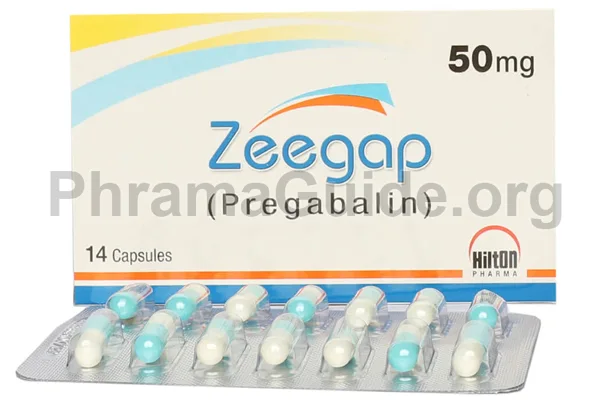Zeegap is a medication that is primarily used to treat neuropathic pain (pain caused by nerve damage) and as an adjunctive treatment for partial seizures. Like any medication, Zeegap can have side effects. Here are some common and less common side effects associated with Zeegap.
Common Side Effects:
- Dizziness: Dizziness is one of the most common side effects of Zeegap. It can lead to unsteadiness and an increased risk of falls, particularly in older adults.
- Drowsiness: Many people taking Zeegap experience drowsiness or sedation. This can affect your ability to concentrate or operate heavy machinery.
- Dry Mouth: Dry mouth is a common side effect and can be managed by staying well-hydrated and using sugar-free gum or lozenges.
- Weight Gain: Some individuals may experience weight gain as a side effect of Zeegap. This can be concerning for those with existing weight issues.
- Peripheral Edema: Swelling of the extremities, such as the hands and feet, can occur. This may be due to fluid retention.
- Blurred Vision: Blurred vision or changes in vision can occur while taking Zeegap.
- Headache: Headaches are a relatively common side effect.
Less Common Side Effects:
- Mood Changes: Some people may experience mood changes, such as irritability, anxiety, or even symptoms of depression. It is important to discuss any mood changes with your healthcare provider.
- Tremors or Shaking: In rare cases, Zeegap can cause tremors or shaking.
- Memory and Concentration Problems: Some people report difficulties with memory and concentration while taking Zeegap.
- Gastrointestinal Disturbances: This can include constipation, diarrhea, or nausea.
- Muscle Pain or Weakness: Some individuals may experience muscle pain or weakness while on Zeegap.
- Withdrawal Symptoms: If Zeegap is discontinued suddenly, withdrawal symptoms such as anxiety, sleep disturbances, nausea, and sweating can occur. It’s important to taper off the medication gradually if you need to stop it.
- Allergic Reactions: While rare, allergic reactions can occur, with symptoms such as rash, itching, swelling of the face or throat, and difficulty breathing. Seek immediate medical attention if you experience these symptoms.
- Suicidal Thoughts: Although relatively rare, Zeegap has been associated with an increased risk of suicidal thoughts in some people. If you experience such thoughts, contact a healthcare professional immediately.

What is Zeegap?
Zeegap is one of the leading brands of Pregabalin, manufactured and marketed by Hilton Pharmaceuticals, Pakistan.
Zeegap : Available Formulations and Strengths
Presently, Zeegap is available in Capsule form only. (Zeegap is not available in Tablet Form)
Zeegap Capsules : 25mg, 50mg, 75mg, 100mg, and 150mg strengths
What Are The Possible Drug Interactions of Zeegap?
- Sedatives and Central Nervous System Depressants: Zeegap can enhance the sedative effects of drugs like benzodiazepines, opioids, and certain sleep medications. Combining Zeegap with these substances can lead to increased drowsiness and impaired coordination.
- Alcohol: Alcohol is a central nervous system depressant, and its effects can be potentiated when combined with Zeegap. This can lead to increased sedation and the risk of accidents.
- Other Antiepileptic Medications: Zeegap is sometimes used alongside other antiepileptic drugs. Combining it with these medications can enhance the side effects and increase the risk of drowsiness and dizziness.
- Angiotensin-Converting Enzyme (ACE) Inhibitors and Diuretics: These medications, used to treat high blood pressure and heart conditions, may interact with Zeegap and cause swelling or peripheral edema.
- Narcotic Pain Medications: Zeegap can increase the effects of narcotic pain medications, which can lead to excessive drowsiness and respiratory depression.
- Thiazolidinediones: Zeegap may increase the risk of edema (swelling) when used with thiazolidinedione drugs, which are used to treat diabetes.
- Selective Serotonin Reuptake Inhibitors (SSRIs) and Serotonin-Norepinephrine Reuptake Inhibitors (SNRIs): There have been reports of increased risk of serotonin syndrome when Zeegap is used with these antidepressant medications. Symptoms of serotonin syndrome include agitation, confusion, rapid heart rate, and high blood pressure.
- CNS Stimulants: Medications like methylphenidate and amphetamines can counteract the sedative effects of Zeegap and may lead to a loss of effectiveness.
- Cimetidine: This medication used for heartburn and stomach ulcers can increase the blood levels of Zeegap, potentially leading to an increased risk of side effects.

Leave A Comment